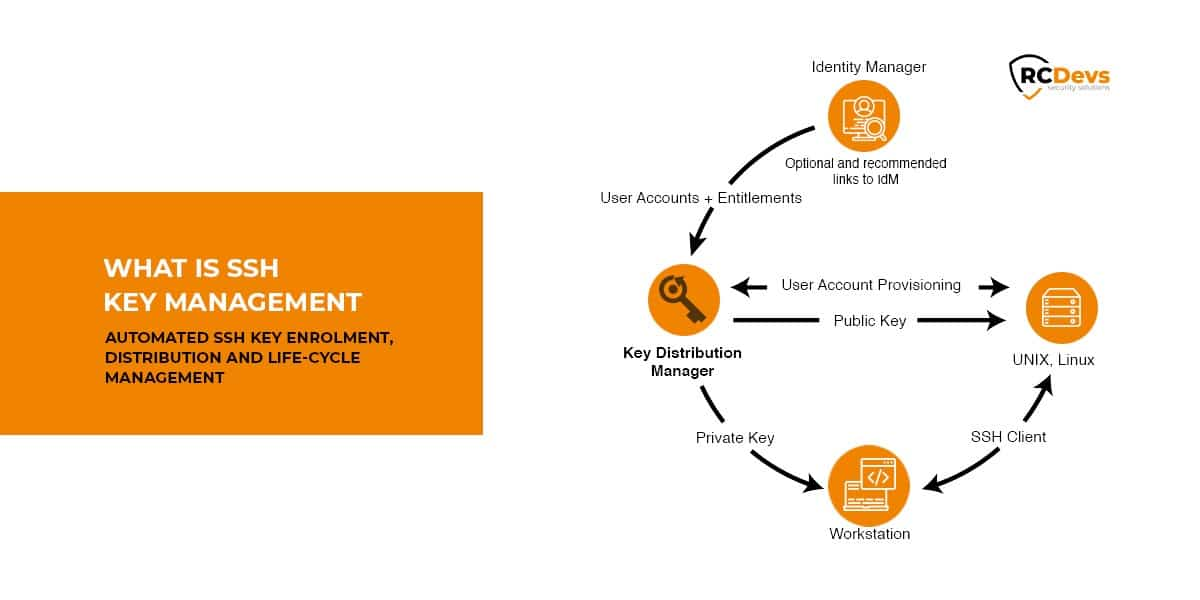SSH Key Management Best Practices: A Comprehensive Guide To Secure Your Network
SSH key management is an essential aspect of modern cybersecurity practices. As organizations increasingly rely on remote access and cloud-based infrastructure, securing communication between systems has become more critical than ever. SSH keys serve as the backbone of secure communication, but without proper management, they can pose significant security risks.
Understanding SSH key management best practices is crucial for maintaining the integrity of your network and protecting sensitive data. Misconfigured or poorly managed SSH keys can lead to unauthorized access, data breaches, and compliance violations. This article will explore the importance of SSH key management and provide actionable strategies to enhance your organization's security posture.
Whether you're a system administrator, IT professional, or cybersecurity enthusiast, this guide will equip you with the knowledge and tools needed to implement robust SSH key management practices. Let's dive into the details and discover how you can safeguard your systems effectively.
Read also:Uma Thurman In Pulp Fiction A Deep Dive Into Her Iconic Role
Table of Contents:
- Introduction to SSH Key Management
- Importance of SSH Key Management
- Best Practices for SSH Key Management
- Automating SSH Key Management
- Securing SSH Keys
- Monitoring and Auditing SSH Keys
- Compliance and Regulations
- Common Mistakes in SSH Key Management
- Tools for SSH Key Management
- Future of SSH Key Management
- Conclusion and Next Steps
Introduction to SSH Key Management
SSH (Secure Shell) is a cryptographic protocol used for secure communication over unsecured networks. SSH keys play a vital role in authenticating users and systems, replacing the need for passwords in many cases. Proper SSH key management ensures that only authorized entities gain access to sensitive systems and data.
SSH keys consist of two parts: a private key, which must be kept confidential, and a public key, which can be shared with servers or other systems. The public key is used to encrypt data, while the private key decrypts it. This asymmetric encryption provides a secure way to authenticate without transmitting sensitive information over the network.
Effective SSH key management involves several key aspects, including key generation, distribution, revocation, and monitoring. Organizations must adopt best practices to ensure that SSH keys are managed securely and efficiently, minimizing the risk of unauthorized access.
Importance of SSH Key Management
SSH key management is critical for maintaining the security and integrity of your network infrastructure. Without proper management, SSH keys can become a significant liability, leading to potential security breaches and compliance issues. Here are some reasons why SSH key management is essential:
- Prevent Unauthorized Access: Misconfigured or poorly managed SSH keys can allow unauthorized users to gain access to sensitive systems and data.
- Ensure Compliance: Many industries have strict regulations regarding data security and access control. Proper SSH key management helps organizations meet these compliance requirements.
- Reduce Security Risks: By implementing best practices for SSH key management, organizations can significantly reduce the risk of security breaches and data leaks.
- Improve Efficiency: Automated SSH key management solutions can streamline the process, reducing administrative overhead and improving overall efficiency.
Best Practices for SSH Key Management
To ensure the security and integrity of your SSH keys, it's essential to follow best practices. Below are some key strategies for effective SSH key management:
Read also:Skylar Satenstein The Rising Star Of Comedy And Acting
Use Strong and Unique Keys
Generating strong and unique SSH keys is the foundation of secure key management. Here are some tips for creating robust SSH keys:
- Use a key length of at least 2048 bits for RSA keys or consider using ED25519 for better performance and security.
- Avoid reusing keys across multiple systems to minimize the risk of compromise.
- Protect private keys with passphrases to add an additional layer of security.
Limit Key Lifetime
Setting an expiration date for SSH keys ensures that outdated or compromised keys are automatically removed from the system. Consider the following practices:
- Define a clear key lifecycle policy, including creation, usage, and revocation.
- Regularly review and update SSH keys to ensure they remain secure and relevant.
- Implement automated processes to expire keys after a predefined period.
Automating SSH Key Management
Manual SSH key management can be time-consuming and error-prone. Automating the process can significantly improve efficiency and reduce the risk of human error. Here are some automation strategies:
- Use configuration management tools like Ansible, Puppet, or Chef to automate key deployment and management.
- Implement centralized key management systems to streamline the process and ensure consistency across the organization.
- Utilize scripting languages like Python or Bash to automate repetitive tasks related to SSH key management.
Securing SSH Keys
Protecting SSH keys from unauthorized access is crucial for maintaining their security. Follow these guidelines to secure your SSH keys:
- Store private keys in a secure location, such as a hardware security module (HSM) or encrypted file system.
- Restrict access to private keys using file permissions and access controls.
- Monitor for unauthorized attempts to access or modify SSH keys.
Monitoring and Auditing SSH Keys
Regular monitoring and auditing of SSH keys help ensure that they are being used appropriately and securely. Consider the following practices:
- Implement logging and monitoring solutions to track SSH key usage and detect suspicious activity.
- Conduct periodic audits to verify that all SSH keys are properly managed and up-to-date.
- Establish a process for investigating and responding to potential SSH key-related security incidents.
Compliance and Regulations
Many industries have specific regulations regarding data security and access control. Organizations must ensure that their SSH key management practices comply with these regulations. Some relevant standards include:
- General Data Protection Regulation (GDPR)
- Payment Card Industry Data Security Standard (PCI DSS)
- Health Insurance Portability and Accountability Act (HIPAA)
By adhering to these standards, organizations can protect sensitive data and avoid costly fines and penalties.
Common Mistakes in SSH Key Management
Even with the best intentions, organizations can make mistakes in SSH key management. Here are some common errors to avoid:
- Using weak or default keys
- Failing to revoke or expire unused keys
- Not securing private keys properly
- Overlooking key management policies and procedures
By recognizing and addressing these mistakes, organizations can improve their SSH key management practices and enhance overall security.
Tools for SSH Key Management
Several tools and solutions are available to assist with SSH key management. Some popular options include:
- OpenSSH: A widely used open-source SSH implementation with built-in key management capabilities.
- SSHKeychain: A centralized SSH key management solution designed for large-scale deployments.
- HashiCorp Vault: A tool for securely storing and managing secrets, including SSH keys.
Choosing the right tool depends on your organization's specific needs and infrastructure.
Future of SSH Key Management
As technology continues to evolve, so too will the methods and tools for SSH key management. Emerging trends, such as quantum computing and blockchain, may impact how keys are generated and managed in the future. Organizations must stay informed and adapt to these changes to maintain robust security practices.
Conclusion and Next Steps
In conclusion, SSH key management is a critical component of modern cybersecurity practices. By following best practices, automating processes, and utilizing the right tools, organizations can effectively manage their SSH keys and protect their networks from potential threats.
We encourage you to take action by reviewing your current SSH key management practices and implementing the strategies outlined in this article. For more information on cybersecurity and related topics, explore our other articles and resources. Feel free to leave a comment or share this article with your colleagues to spread awareness about the importance of SSH key management.
Article Recommendations


